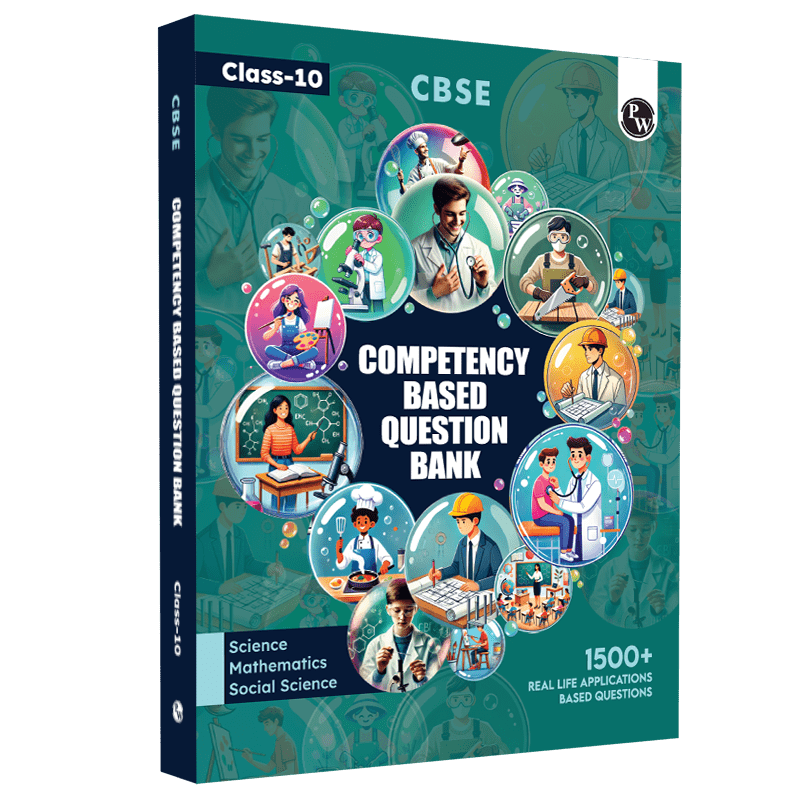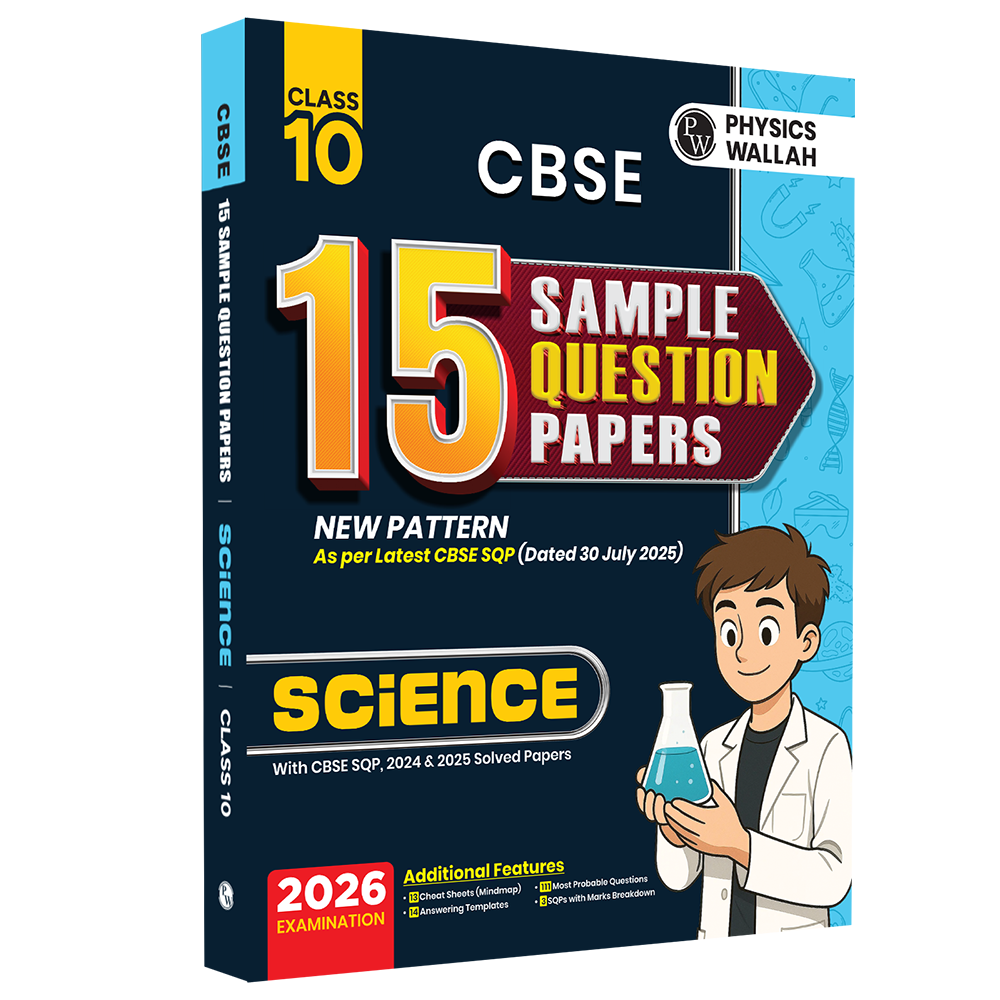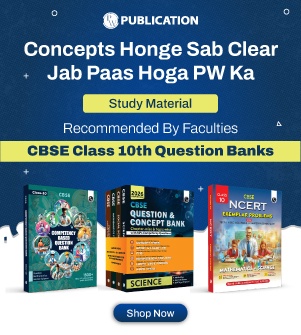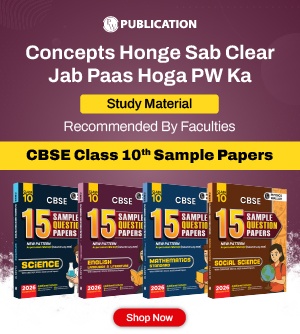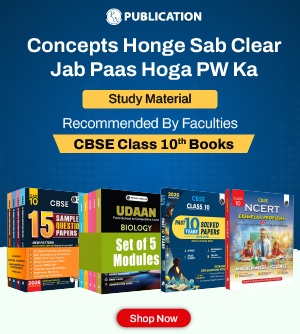Competency Based Class 10 Science 2024 Questions and Answers

Competency Based Questions Class 10 Science:- Competency Based Questions (CBQs) for Class 10 Science are a new addition for the 2024-25 academic year, introduced by CBSE to make science learning more practical and engaging. These questions go beyond simple memorization, focusing on how well students can apply what they've learned to real-life situations. By challenging students to think critically and solve problems, CBSE Class 10 Question Banks aim to deepen their understanding of science and better prepare them for future studies and real-world challenges.
Q: 1 Which of the following is an example of simple displacement?
-
the electrolysis of water
-
the burning of methane
-
the reaction of a metal with an acid
-
the reaction of two salt solutions to form a precipitate
Q: 2 Which of the following is a NECESSARY condition for ALL chemical reactions?
-
The reactants should be in the same state.
-
Energy should be supplied to the reactants.
-
The reactants should be at the same temperature.
-
There should be physical contact between the reactants.
Q: 3 Given below is the balanced chemical equation for the thermal decomposition of lead nitrate.
2 Pb(NO₃)₂ ---> 2 PbO + 4 NO₂ + O₂
Which of the following information does the coefficients of PbO and NO₂ in the equation (2 and 4 respectively) tell us?
-
the ratio of the number of moles produced of the two substances
-
the ratio of the number of atoms in the two substances
-
the ratio of the mass produced of the two substances
-
the ratio of the densities of the two substances
Q: 4 The diagram below shows the set-up in which electrolysis of water takes place.
(a) What type of reaction takes place?
(b) Explain why this is an example of an endothermic reaction?
(c) The test tube containing hydrogen is removed carefully from the apparatus. A lit match stick is brought near the mouth of this test tube. The gas burns with an explosive "pop" sound.
Write a balanced chemical equation for this reaction and indicate whether energy is absorbed or released.
Q: 5 A remarkable property of acids is that they can 'dissolve' metals. When metals are added to an acid, they disintegrate and disappear into the acid.
(a) State one other common observation when metals 'dissolve' in acids. Explain the reason for this observation.
(b) If the acid with the 'dissolved' metal is evaporated, can we get the metal back? Why or why not?
(c) In this question, the word 'dissolve' is used within quotes. This is because it is not actually an example of dissolving. What is the MAIN difference between a metal 'dissolving' in an acid and sugar dissolving in water?
Check out: CBSE Class 10th Books
Q: 6 Sunita carried out the following reactions in the laboratory:
(i) complete neutralisation of one mole of sodium carbonate with hydrochloric acid
(ii) complete neutralisation of one mole of sodium bicarbonate with hydrochloric acid
She found that the amount of carbon dioxide formed in both the reactions was the same.
(a) Is her finding correct? Justify your answer.
(b) How does the amount of salt formed in case (i) compare with the amount of salt formed in case (ii)?
Q: 7 The blue-coloured solution of the sulphate salt of metal W is taken in a beaker. Metal powders X, Y and Z are added one after the other to the beaker. The colour changes occurring in the solution are shown below.
W-SO₄ Blue solution
Metal X → Colourless solution
Metal Y → Pink solution
Metal Z → Green solution
State what colour change, if any, will occur if metal X is again added to the green solution in the beaker. Explain why. [2]
Q: 8 A piece of iron rusts when it comes in contact with air and moisture. Prakash had two identical shiny iron pieces P and Q. To prevent the pieces from rusting, he coated piece P with oil paint and he galvanized piece Q with a coat of zinc metal. He noticed that the coatings were not complete and that a small part of the iron was exposed in both the pieces.
What is Prakash likely to observe about the exposed parts of the two iron pieces after some days? Explain why. [4]
Competency Based Questions Class 10 Science PDF
CBSE has released the Competency Based Questions (CBQs) for Class 10 Science for the 2024-25 academic session, aimed at helping students prepare for the upcoming exams. These CBQs are designed to assess students' understanding of scientific concepts, critical thinking abilities, and practical application skills. With a focus on real-world problem-solving, the Class 10 Science CBQs encourage students to move beyond memorization and develop a deeper grasp of the subject matter. The PDF offers a variety of question types, including case-based, MCQs, and source-based questions, ensuring a comprehensive approach to exam preparation. Click the below link to download the Competency Based Questions Class 10 PDF:-
Competency Based Questions Class 10 2024-25 PDF
Why Does CBSE Issue Competency-Focused Practice Question?
-
Fostering Real-World Skills:
CBSE is moving away from rote learning to focus on skills that truly matter. With Competency-Based Questions (CBQs) in Class 10 Science, the aim is to help students apply their learning to real-life situations, making science more practical and relevant. -
Connecting Theory to Practice:
CBQs bridge the gap between what’s taught in the classroom and how it applies outside of it. In Class 10 Science, these questions push students to think beyond the textbook and use scientific concepts to solve real-world problems, which is crucial for their future studies and careers. -
Testing Critical Thinking:
Instead of just memorizing facts, CBQs focus on testing how well students understand and think through problems. In Class 10 Science, CBSE uses these questions to assess a student’s ability to analyze, evaluate, and find solutions, which are essential skills for life beyond school. -
Building Strong Foundations:
CBQs help students strengthen their grasp of key concepts rather than just cramming for exams. This approach ensures that in Class 10 Science, students develop a deeper understanding that will benefit them in future studies, competitive exams, and everyday problem-solving.
Purchase the Competency Based Class 10 Science Book to score high in CBSE Class 10th Boards.
-
Encouraging Lifelong Learning:
Competency-based assessments are designed to instill a love for learning that goes beyond the classroom. In Class 10 Science, these questions challenge students to think critically and continue learning, even after the exams are over. -
Preparing for Global Challenges:
CBSE is aligning its education system with global standards, and CBQs are part of that effort. By using these questions in Class 10 Science, students are better equipped to handle international academic and professional challenges, where real-world application of knowledge is key. -
Inspiring Creativity and Innovation:
CBQs give students room to think creatively and come up with unique solutions. In Class 10 Science, this approach encourages students to explore new ideas and think innovatively, which is essential in today’s fast-changing world.
Benefits of CBSE Competency Based Questions
-
Deeper Understanding: CBSE Competency Based Questions (CBQs) help students move beyond just memorizing facts. By applying their knowledge to real-life situations, they gain a better and more practical understanding of the subject.
-
Boosted Critical Thinking: These questions challenge students to think critically and solve problems, which sharpens their analytical skills. This makes them more adept at tackling complex issues and prepares them for future academic and real-world challenges.
-
Practical Application: CBQs connect what students learn in the classroom with how it applies to everyday life. This practical approach makes science more relevant and helps students see how their learning fits into the real world.
-
Active Engagement: By focusing on applying knowledge rather than just recalling it, CBQs make learning more engaging. Students become more involved in their studies and learn to think actively and creatively.
-
Better Exam Readiness: Preparing for CBQs helps students get ready for exams by practicing different types of questions. They become more skilled at handling various question formats and more confident in their problem-solving abilities.
Also check out, CBSE Class 10th Sample Papers
Competency Based Questions Class 10 Science FAQs
Q1. What are Competency-Based Questions (CBQs)?
Ans. CBQs are designed to assess a student's ability to apply their knowledge to real-world scenarios, focusing on critical thinking and problem-solving rather than rote memorization.
Q2. Why has CBSE introduced CBQs for Class 10 Science?
Ans. CBSE introduced CBQs to move away from memorization-based learning and to encourage students to understand and apply scientific concepts practically.
Q3. How are CBQs different from traditional exam questions?
Ans. Unlike traditional questions that often test factual recall, CBQs focus on applying knowledge to solve problems, analyze scenarios, and connect concepts with real-life situations.
Q4. What types of questions are included in CBQs?
Ans. CBQs can include multiple-choice questions (MCQs), case-based questions, source-based questions, and others that require students to analyze, evaluate, and apply their knowledge.
Q5. What are the benefits of answering CBQs?
Ans. CBQs enhance critical thinking, improve problem-solving skills, connect theoretical knowledge to practical situations, and prepare students for higher education and future careers.
